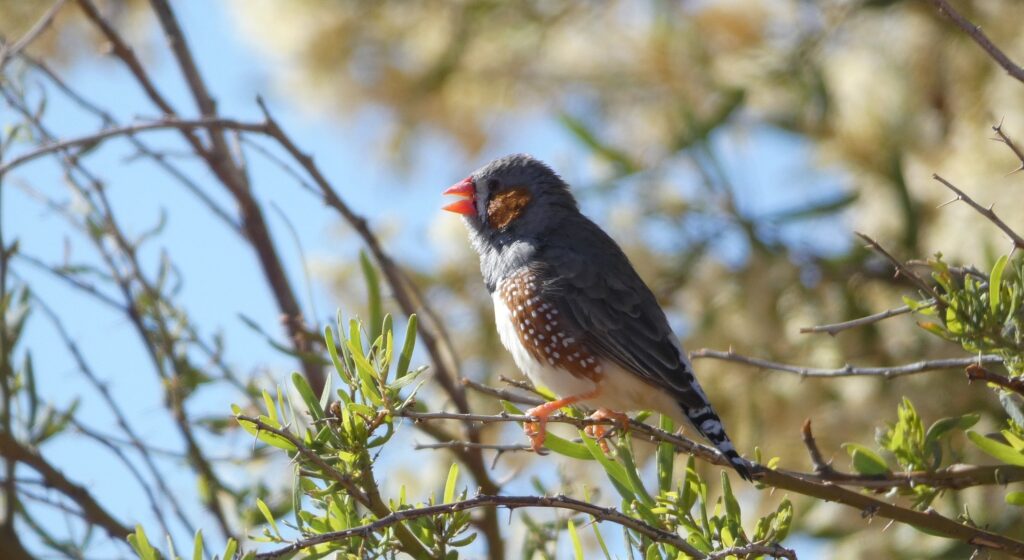According to classical theory, birds sing to attract a partner or to mark their territory. The zebra finch, a model bird for research on bird song, challenges this insight. The most extensively researched bird in the world only sings softly to advertise its presence to its fellow zebra finches, PhD candidate Hugo Loning discovered.
Loning conducted his research on the zebra finch’s song in Australia, the place of origin of this small bird that is also a popular domestic bird. Fowlers Gap Arid Zone Research Station (New South Wales) is home to a population of zebra finches that have been studied since 2005. The birds partly inhabit nesting blocks, considerably increasing their survival rate.
Loning recorded the song and call of the birds, edited a standard sound and measured how far the different frequencies of this sound carried. He then compared this to the zebra finch’s hearing threshold, which had been determined in previous research. The results are remarkable. On average, zebra finches hear each other from a distance of 9 metres.
All males have their unique song, which makes them easy to recognise
Hugo Loning, PhD graduate Behavioural Ecology group
‘That is the detection range’, Loning explains. ‘At nine metres, you hear only some of the song. All males have their unique songs, which makes them easy to recognise. I used the loudest parts of the song for my measurements. Moreover, this is the average. There is a lot of variation in the birds’ volume. I measured an average volume of 50 decibels, but the loudest bird sang at twice that volume.’’

Loning also studied the distance between the birds when they sing. That distance averages just one-and-a-half metres, an observation that is supported by the measurements. Wild zebra finches actually whisper more than they sing. ‘You must pay close attention and really listen closely’, Loning says. ‘And that, with the human hearing threshold being lower than it is in birds.’
Monogamous
The zebra finch’s song is too soft to communicate across distances. And marking their territory is unnecessary, according to Loning, as they are not territorial. The whispered song is not very useful to woo a distant partner either. But zebra finches are monogamous and loyal by nature. Most of the singing happens once a partner has already been found.
From an ecological perspective, the song’s purpose deviates
Hugo Loning, PhD graduate Behavioural Ecology group
So, why do zebra finch sing? Loning wanted to know. ‘My hypothesis is that it is related to the breeding. That information is exchanged within the population during the breeding season. Perhaps their breeding is thus synchronised. Convenient, as there are advantages to having young at the same time. It facilitates young birds in finding partners, for example. Zebra finches are a very social species.’
In any case, the purpose of singing deviates from that of many other birds from northern regions. Is the bird still a suitable model system? ‘Caution is advised’, Loning states carefully. ‘I am not saying the zebra finch is not representative. It certainly is for much research related to bird songs. But from an ecological perspective, the song’s purpose deviates.’

 Photo Hugo Loning
Photo Hugo Loning 

